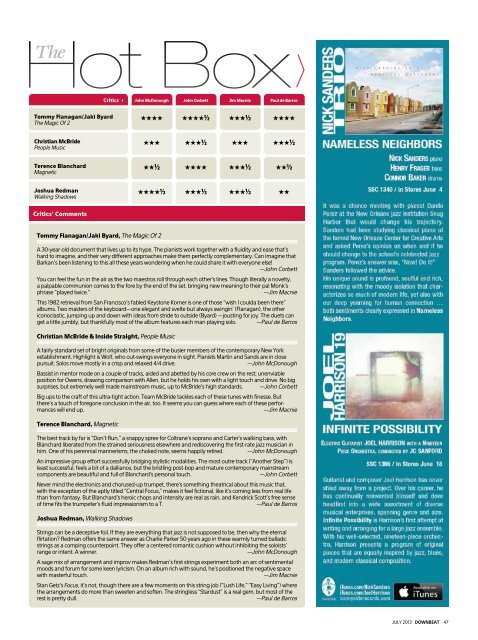Create successful ePaper yourself
Turn your PDF publications into a flip-book with our unique Google optimized e-Paper software.
Hot<br />
The<br />
Box<br />
Critics <br />
John McDonough John Corbett Jim Macnie Paul de Barros<br />
Tommy Flanagan/Jaki Byard<br />
The Magic Of 2<br />
★★★★ ★★★★1/2 ★★★1/2 ★★★★<br />
Christian McBride<br />
People Music<br />
★★★ ★★★1/2 ★★★ ★★★1/2<br />
Terence Blanchard<br />
Magnetic<br />
★★1/2 ★★★★ ★★★1/2 ★★1/2<br />
Joshua Redman<br />
Walking Shadows<br />
★★★★1/2 ★★★1/2 ★★★1/2 ★★<br />
Critics’ Comments<br />
Tommy Flanagan/Jaki Byard, The Magic Of 2<br />
A 30-year-old document that lives up to its hype. The pianists work together with a fluidity and ease that’s<br />
hard to imagine, and their very different approaches make them perfectly complementary. Can imagine that<br />
Barkan’s been listening to this all these years wondering when he could share it with everyone else! <br />
<br />
—John Corbett<br />
You can feel the fun in the air as the two maestros roll through each other’s lines. Though literally a novelty,<br />
a palpable communion comes to the fore by the end of the set, bringing new meaning to their pal Monk’s<br />
phrase “played twice.”<br />
—Jim Macnie<br />
This 1982 retrieval from San Francisco’s fabled Keystone Korner is one of those “wish I coulda been there”<br />
albums. Two masters of the keyboard—one elegant and svelte but always swingin’ (Flanagan), the other<br />
iconoclastic, jumping up and down with ideas from stride to outside (Byard) —jousting for joy. The duets can<br />
get a little jumbly, but thankfully most of the album features each man playing solo. —Paul de Barros<br />
Christian McBride & Inside Straight, People Music<br />
A fairly standard set of bright originals from some of the busier members of the contemporary New York<br />
establishment. Highlight is Wolf, who out-swings everyone in sight. Pianists Martin and Sands are in close<br />
pursuit. Solos move mostly in a crisp and relaxed 4/4 drive.<br />
—John McDonough<br />
Bassist in mentor mode on a couple of tracks, aided and abetted by his core crew on the rest; unenviable<br />
position for Owens, drawing comparison with Allen, but he holds his own with a light touch and drive. No big<br />
surprises, but extremely well made mainstream music, up to McBride’s high standards. —John Corbett<br />
Big ups to the craft of this ultra-tight action. Team McBride tackles each of these tunes with finesse. But<br />
there’s a touch of foregone conclusion in the air, too. It seems you can guess where each of these performances<br />
will end up. <br />
—Jim Macnie<br />
Terence Blanchard, Magnetic<br />
The best track by far is “Don’t Run,” a snappy spree for Coltrane’s soprano and Carter’s walking bass, with<br />
Blanchard liberated from the strained seriousness elsewhere and rediscovering the first-rate jazz musician in<br />
him. One of his perennial mannerisms, the choked note, seems happily retired. —John McDonough<br />
An impressive group effort successfully bridging stylistic modalities. The most outre track (“Another Step”) is<br />
least successful, feels a bit of a dalliance, but the bristling post-bop and mature contemporary mainstream<br />
components are beautiful and full of Blanchard’s personal touch. <br />
—John Corbett<br />
Never mind the electronics and chorused-up trumpet, there’s something theatrical about this music that,<br />
with the exception of the aptly titled “Central Focus,” makes it feel fictional, like it’s coming less from real life<br />
than from fantasy. But Blanchard’s heroic chops and intensity are real as rain, and Kendrick Scott’s free sense<br />
of time fits the trumpeter’s fluid impressionism to a T.<br />
—Paul de Barros<br />
Joshua Redman, Walking Shadows<br />
Strings can be a deceptive foil. If they are everything that jazz is not supposed to be, then why the eternal<br />
flirtation? Redman offers the same answer as Charlie Parker 50 years ago in these warmly turned ballads:<br />
strings as a comping counterpoint. They offer a centered romantic cushion without inhibiting the soloists’<br />
range or intent. A winner.<br />
—John McDonough<br />
A sage mix of arrangement and improv makes Redman’s first strings experiment both an arc of sentimental<br />
moods and forum for some keen lyricism. On an album rich with sound, he’s positioned the negative space<br />
with masterful touch.<br />
—Jim Macnie<br />
Stan Getz’s Focus, it’s not, though there are a few moments on this string job (“Lush Life,” “Easy Living”) where<br />
the arrangements do more than sweeten and soften. The stringless “Stardust” is a real gem, but most of the<br />
rest is pretty dull.<br />
—Paul de Barros<br />
JULY 2013 DOWNBEAT 47

















